America's social safety net is way too skimpy — and horribly designed
We should be spending more money, not less

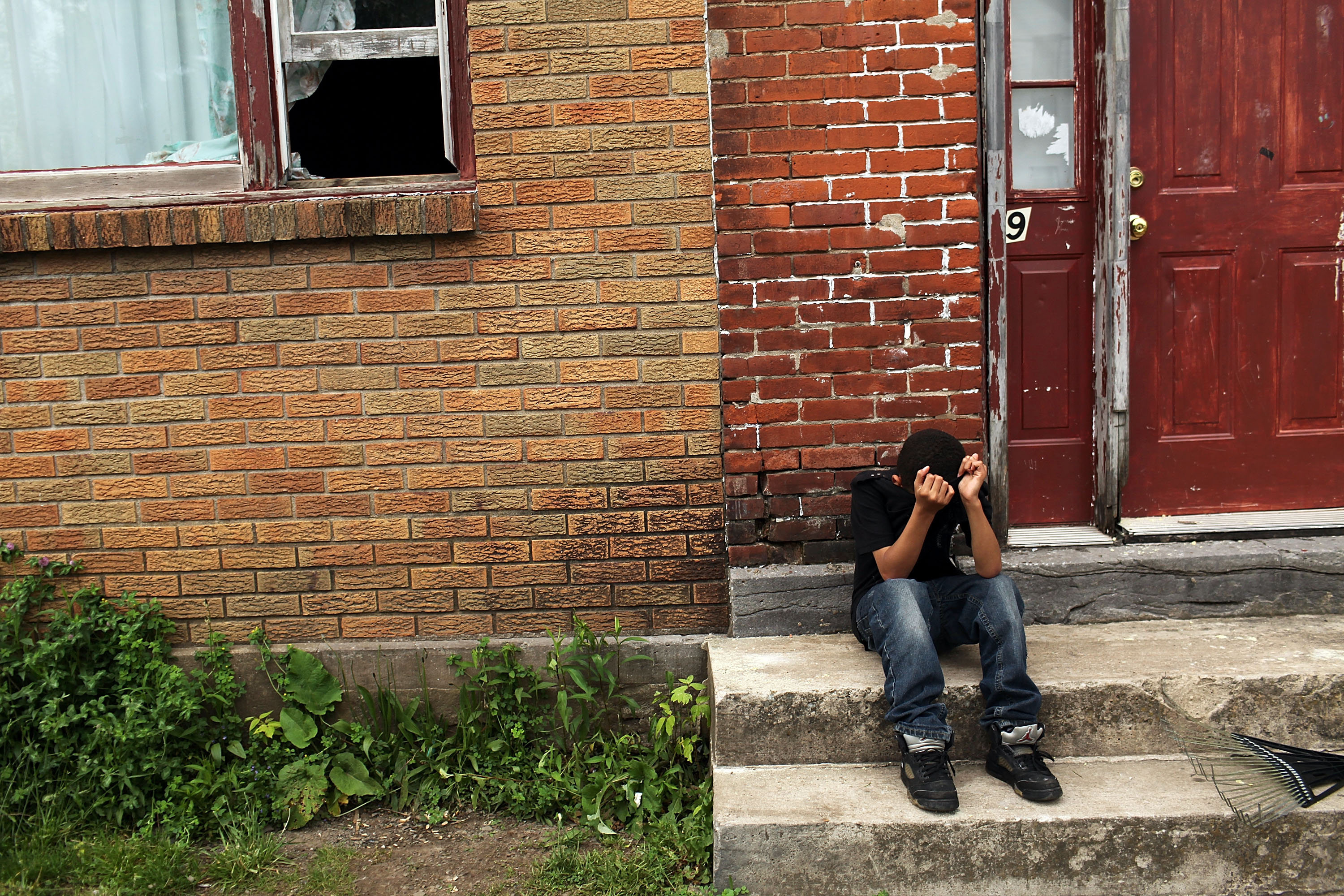
A free daily email with the biggest news stories of the day – and the best features from TheWeek.com
You are now subscribed
Your newsletter sign-up was successful
There are certain facts about American poverty that both the left and right should be able to agree on. The New York Times' conservative columnist Ross Douthat offers two: The U.S. has made real strides in cutting poverty, and this success has not nearly lived up to the hopes laid out when the War on Poverty and the Great Society programs began in the 1960s. He's absolutely right. And yet, we still debate these straightforward realities.
Part of the confusion is due to the government's official poverty measure (OPM), which is poorly suited to gauging progress in poverty reduction. So since 2009, the government has offered a better metric: the supplemental poverty measure (SPM). In 2013, some researchers took a modified version of the SPM and mapped it back onto the U.S. economy going back to 1967. And it shows real progress:
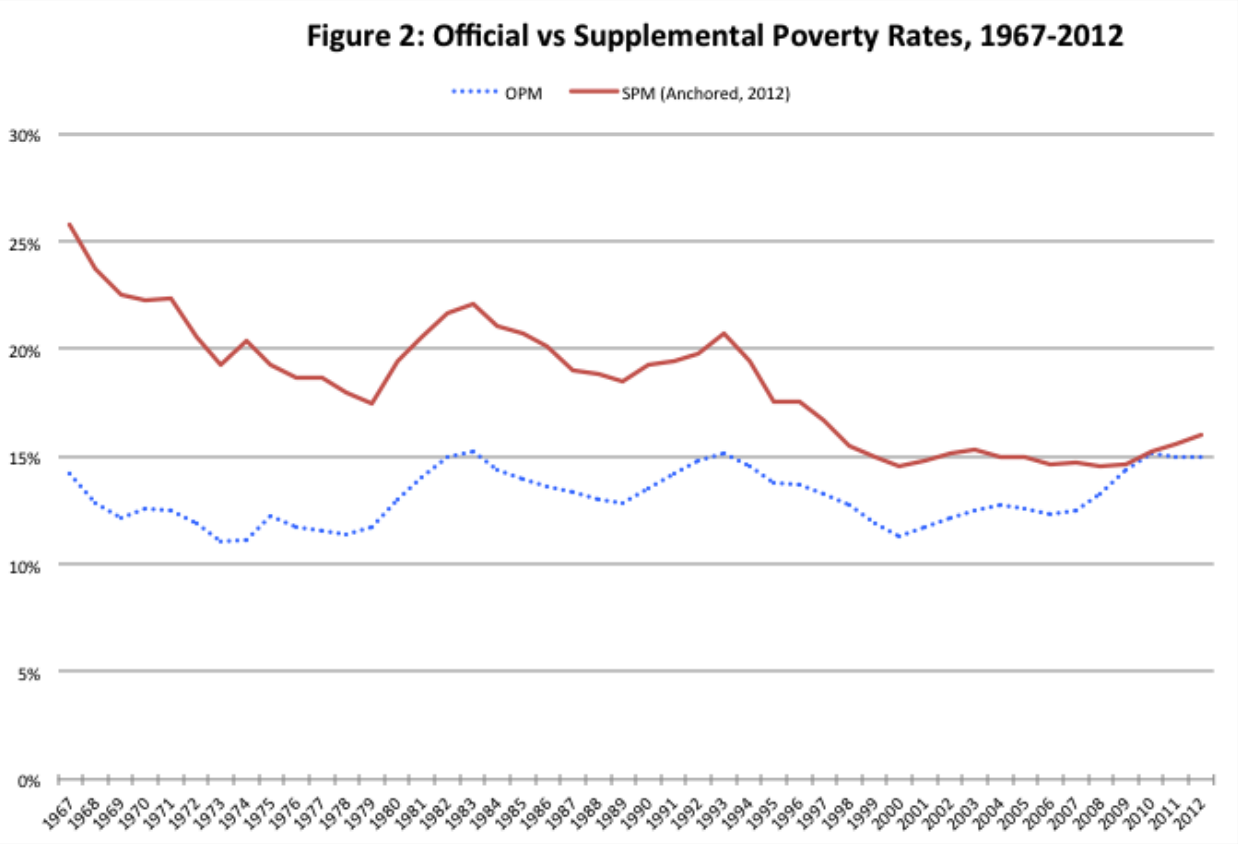
(Trends in Poverty with an Anchored Supplemental Poverty Measure.)
The Week
Escape your echo chamber. Get the facts behind the news, plus analysis from multiple perspectives.

Sign up for The Week's Free Newsletters
From our morning news briefing to a weekly Good News Newsletter, get the best of The Week delivered directly to your inbox.
From our morning news briefing to a weekly Good News Newsletter, get the best of The Week delivered directly to your inbox.
Of course, 16 percent of Americans living in poverty is still disappointingly high. And in many ways that go beyond income — the stability of marriages and families and the health of local communities, for starters — the situation for America's lower class seems to have gotten considerably worse.
So in the interest of moving the discussion forward, here's another point I think both sides ought to be able to agree on: The U.S. social safety net was never, ever big enough. This doesn't explain all of the problems we now face. And conservatives may still reject the goals of the Great Society on a priori philosophic or ideological grounds. But given the goals that were actually set, American welfare programs never had the resources or scope they needed.
Start with government spending. In 2007, the United States spent about 16 percent of its gross domestic product on the social safety net. That expanded to about 19 percent by 2014, though that was mostly a temporary bulge thanks to the recession. Meanwhile, Norway's 2007 spending was 20 percent, Finland's was 23 percent, Sweden's 27 percent, France's 28 percent, and Germany's 25 percent.
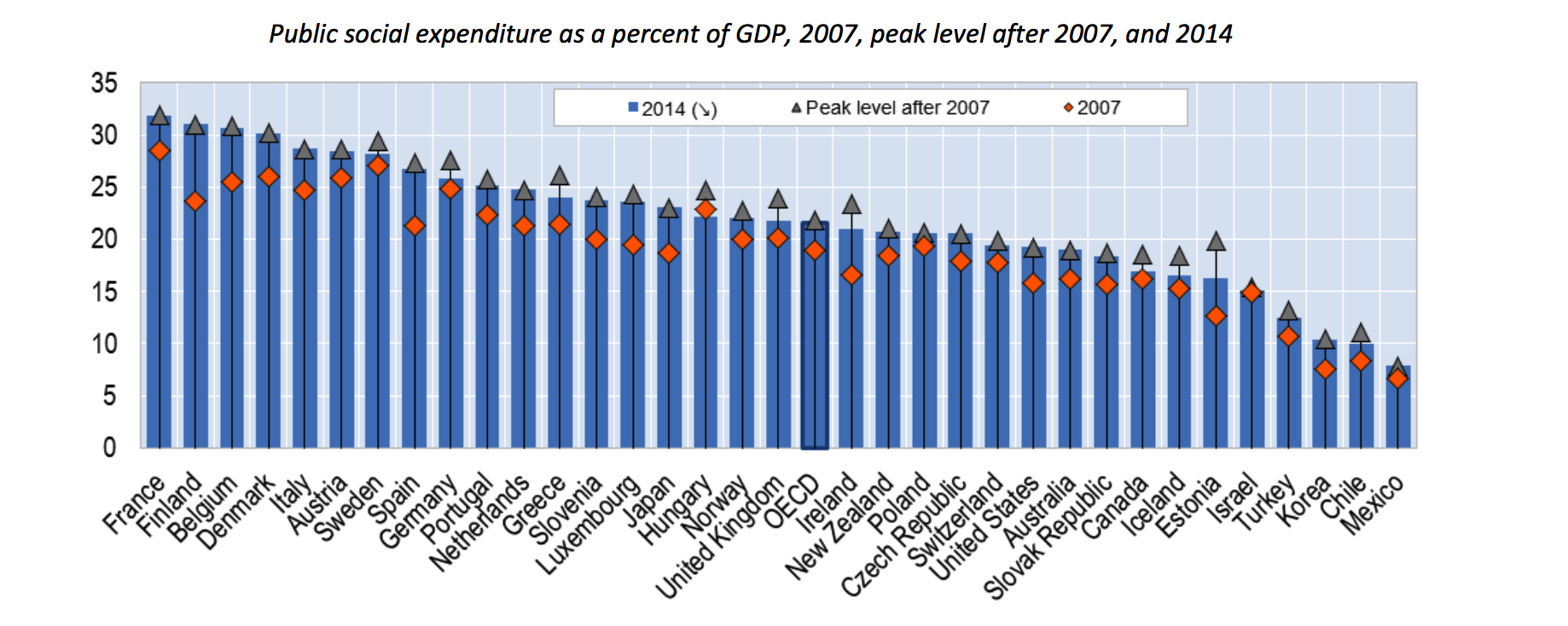
(Organisation for Economic Co-operation and Development's Social Expenditure Update, 2014)
A free daily email with the biggest news stories of the day – and the best features from TheWeek.com
Up until the mid-1970s, America's safety net spending almost kept up with the average among other advanced Western countries. Then it broke off, and has stayed several percentage points of GDP below the average ever since.
Now, the U.S. does direct an enormous amount of help to people through the job market, and especially through the tax code. We may not have much housing assistance, but we have the mortgage interest deduction; we may not have single-payer health care, but we make health benefits on the job tax-free. When you include this "spending" along with more traditional safety net programs, America leaps from one of the lowest providers of aid to one of the highest.
But this type of "spending" doesn't tend to go where it needs to. One of the main reasons people are poor is because society makes it harder for them to access work. So aid that's tied to employment tends to get captured by the middle and upper classes. In this limited sense, the U.S. safety net isn't "too small," it's just really horribly designed and really poorly positioned.
Unfortunately, that design is arguably intended. Conservatives often want to tie safety net programs to having a job, so that people aren't tempted by handouts to hold off working. There are work requirements for food stamps. More heavy requirements were added to traditional welfare in the late 1990s. And now Republicans are suggesting requirements for Medicaid as well. This makes little sense. The much more generous European systems have higher labor force participation, and the U.S. economy has done progressively worse over the last three decades at actually creating enough jobs for everyone to have.
Add it all up, and it's not surprising that most other advanced Western countries have much lower poverty rates than America.
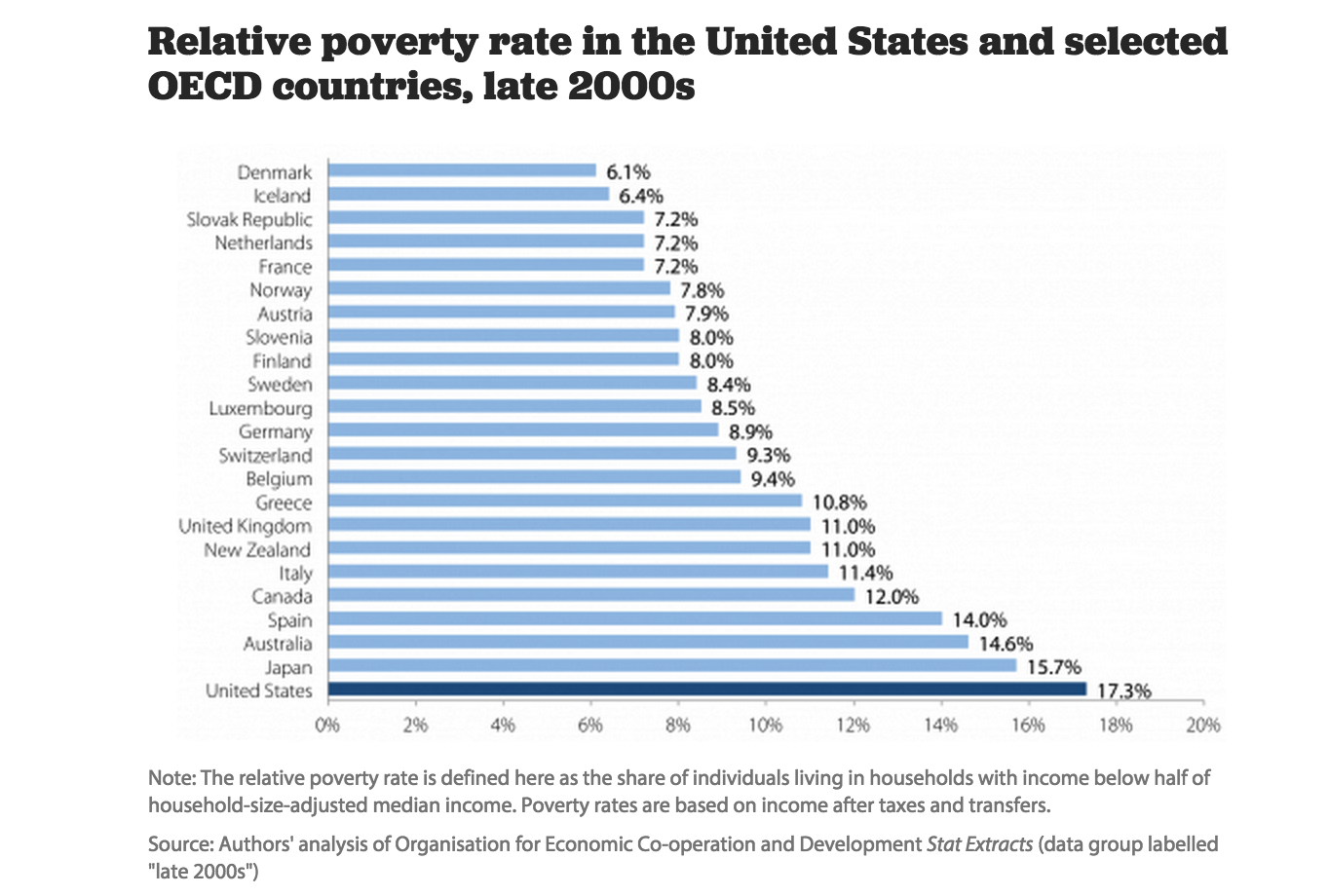
(U.S. poverty rates higher, safety net weaker than in peer countries, the Economic Policy Institute, 2012)
Now, those comparisons between countries use international measures of poverty, which are based on a relative metric; if you're below 50 percent of the median income in that country, you're in poverty.
The old and new poverty rates used by the U.S. government are based on an absolute level. So if you're looking for an apples-to-apples comparison by that standard, researchers have also surveyed people in both the U.S. and other Western countries about their levels of material deprivation. Do they get enough food and clothing, can they afford rent or insurance, how is their financial situation, etc. As economist Lane Kenworthy points out, it provides a more consistent metric. And the U.S. does not fair well:
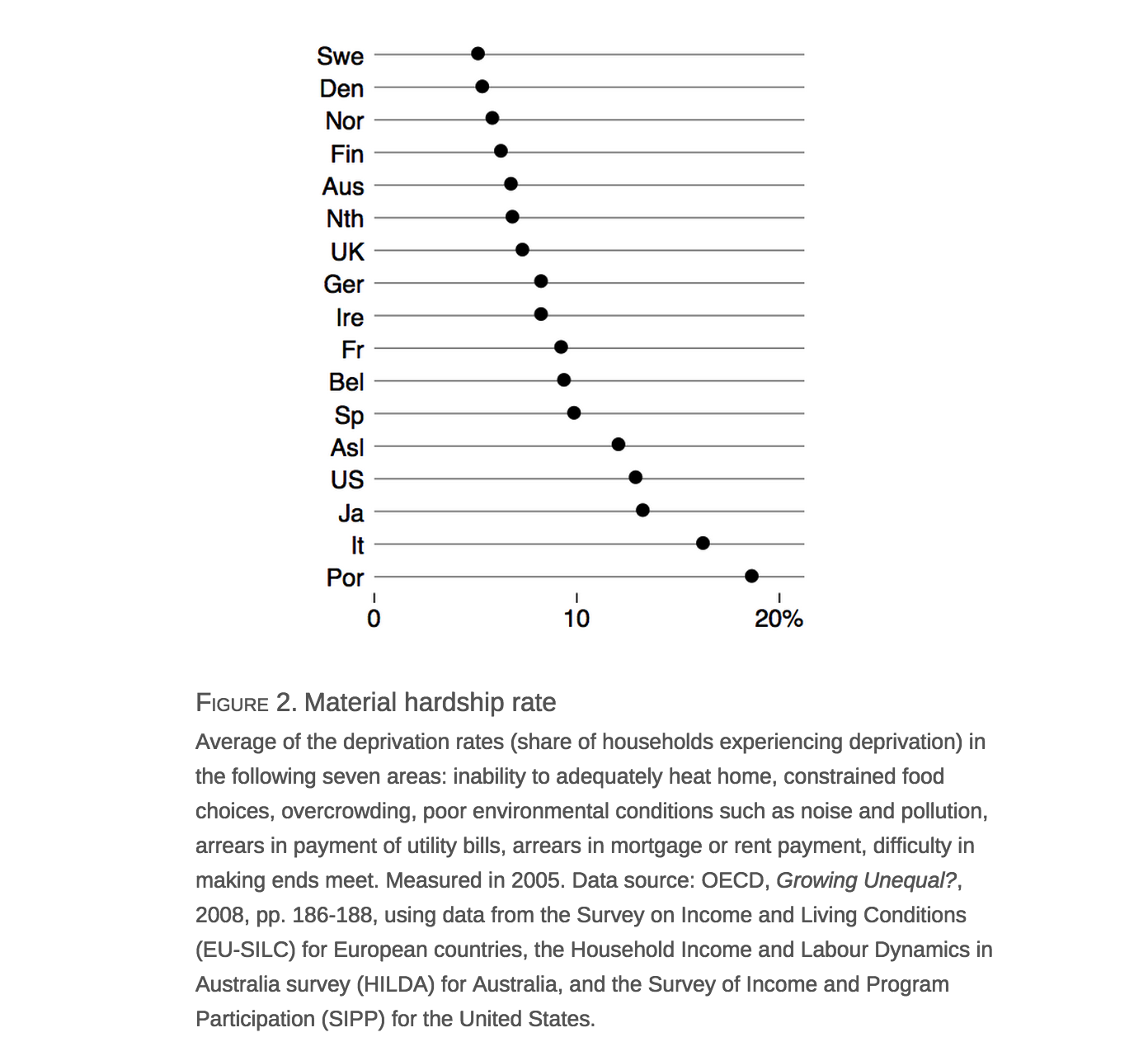
(A Decent Income and A Rising Floor)
Kenworthy also did an apples-to-apples comparison of the incomes for the bottom ten percent of households in America and other countries, after taxes and all assistance programs are accounted for:
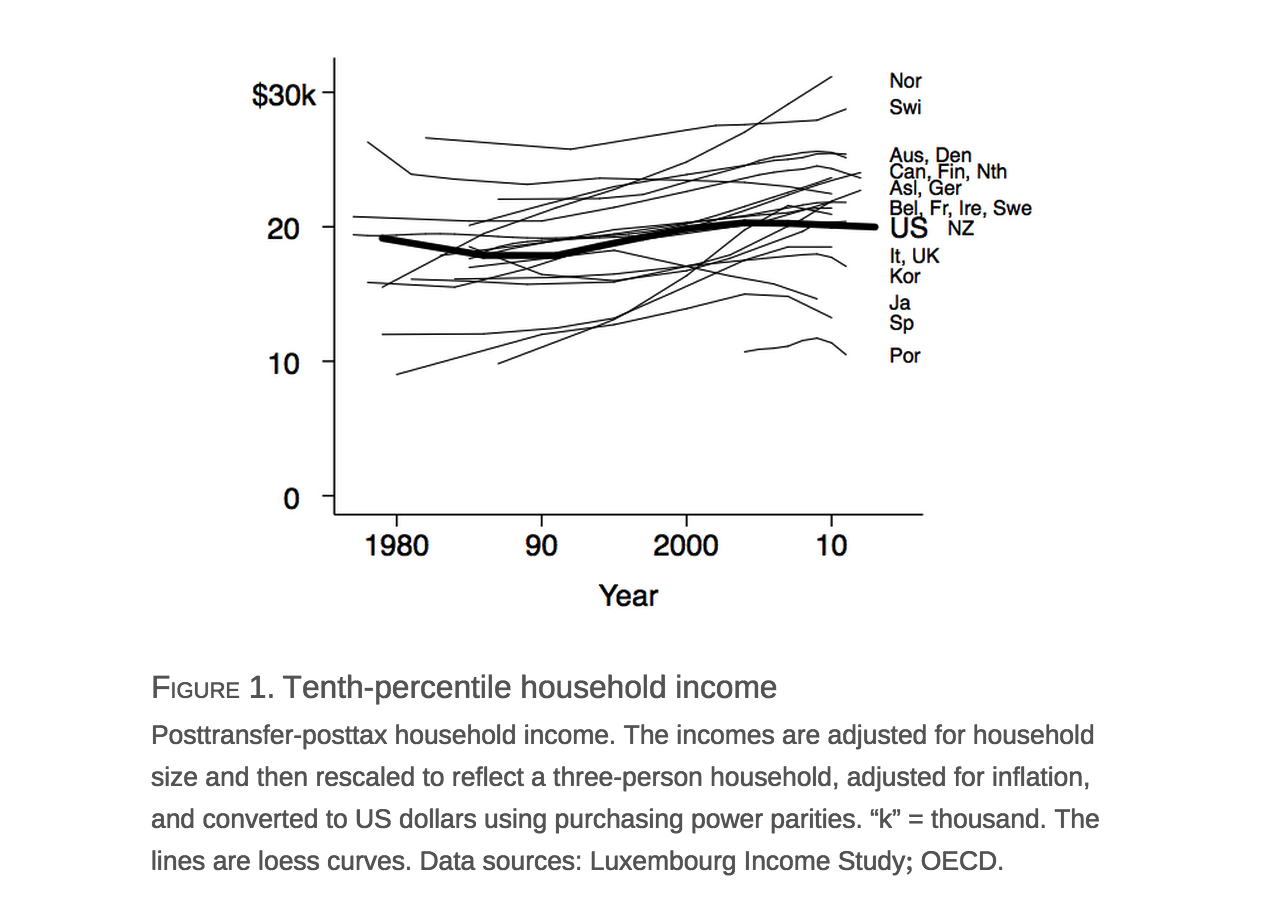
(A Decent Income and A Rising Floor)
Again, not a pretty picture.
Another way to look at it is like this: The one population that America took a relatively "European" approach to was the elderly. We gave them single-payer healthcare with Medicare and Medicaid, and we gave them a large and universal cash transfer program with Social Security. This setup isn't as generous as other Western countries' treatment of the elderly, but it's much more generous than the safety net programs America provides for the disabled, the unemployed, or for children. And over the last few decades, we cut elderly poverty way, way, way down.
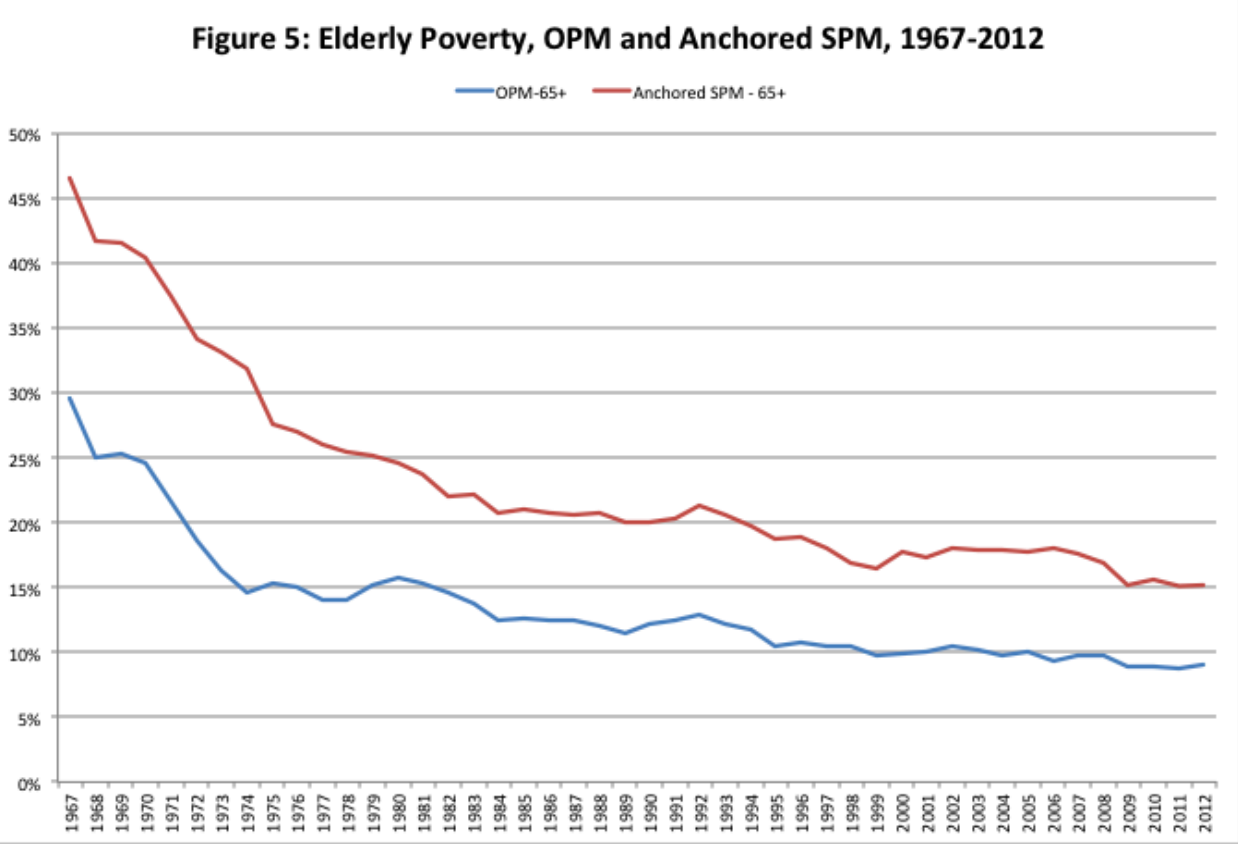
(Trends in Poverty with an Anchored Supplemental Poverty Measure)
As far as the elderly are concerned, America didn't actually do too bad, though it should have done better. For all those other groups, the safety net is and always has been far too weak and ragged.
Jeff Spross was the economics and business correspondent at TheWeek.com. He was previously a reporter at ThinkProgress.
-
 What is the endgame in the DHS shutdown?
What is the endgame in the DHS shutdown?Today’s Big Question Democrats want to rein in ICE’s immigration crackdown
-
 ‘Poor time management isn’t just an inconvenience’
‘Poor time management isn’t just an inconvenience’Instant Opinion Opinion, comment and editorials of the day
-
 Bad Bunny’s Super Bowl: A win for unity
Bad Bunny’s Super Bowl: A win for unityFeature The global superstar's halftime show was a celebration for everyone to enjoy
-
 The billionaires’ wealth tax: a catastrophe for California?
The billionaires’ wealth tax: a catastrophe for California?Talking Point Peter Thiel and Larry Page preparing to change state residency
-
 Bari Weiss’ ‘60 Minutes’ scandal is about more than one report
Bari Weiss’ ‘60 Minutes’ scandal is about more than one reportIN THE SPOTLIGHT By blocking an approved segment on a controversial prison holding US deportees in El Salvador, the editor-in-chief of CBS News has become the main story
-
 Has Zohran Mamdani shown the Democrats how to win again?
Has Zohran Mamdani shown the Democrats how to win again?Today’s Big Question New York City mayoral election touted as victory for left-wing populists but moderate centrist wins elsewhere present more complex path for Democratic Party
-
 Millions turn out for anti-Trump ‘No Kings’ rallies
Millions turn out for anti-Trump ‘No Kings’ ralliesSpeed Read An estimated 7 million people participated, 2 million more than at the first ‘No Kings’ protest in June
-
 Ghislaine Maxwell: angling for a Trump pardon
Ghislaine Maxwell: angling for a Trump pardonTalking Point Convicted sex trafficker's testimony could shed new light on president's links to Jeffrey Epstein
-
 The last words and final moments of 40 presidents
The last words and final moments of 40 presidentsThe Explainer Some are eloquent quotes worthy of the holders of the highest office in the nation, and others... aren't
-
 The JFK files: the truth at last?
The JFK files: the truth at last?In The Spotlight More than 64,000 previously classified documents relating the 1963 assassination of John F. Kennedy have been released by the Trump administration
-
 'Seriously, not literally': how should the world take Donald Trump?
'Seriously, not literally': how should the world take Donald Trump?Today's big question White House rhetoric and reality look likely to become increasingly blurred
